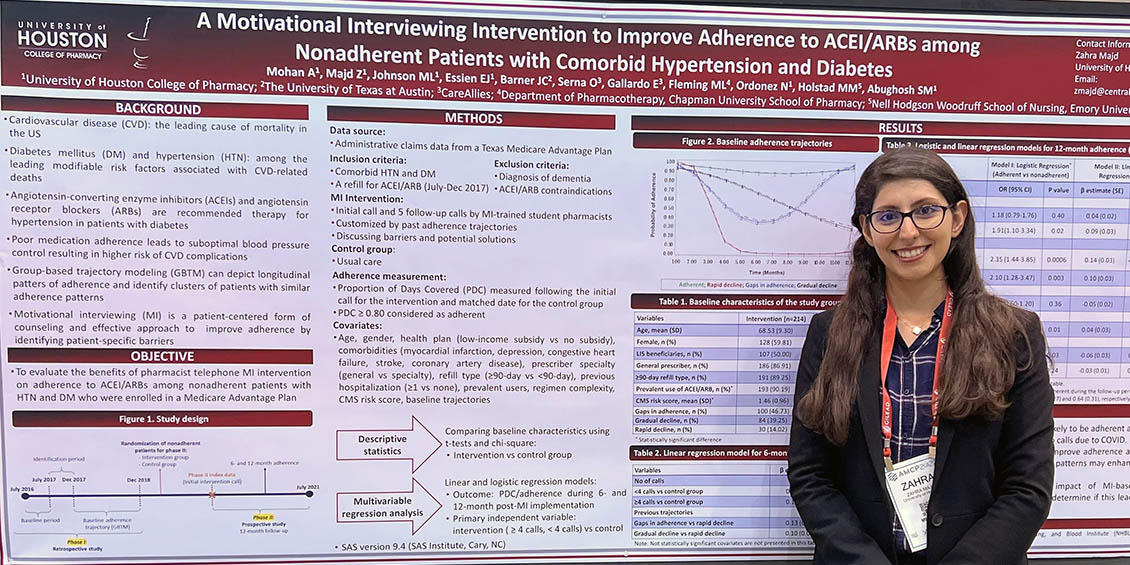Research News
Motivational Interviewing in Hypertension and Diabetes
Ph.D. Student Earns AMCP Best Poster Award for Study Showing Benefits of Phone-based Interventions to Improve Medication Adherence
April 13 — An award-winning study led team of UH College of Pharmacy researchers provides new evidence that telephone-based interventions conducted by pharmacy students are an effective tool for improving medication adherence among nonadherent patients with hypertension and diabetes.
The study, presented by UHCOP Ph.D. candidate Zahra Majd, Pharm.D., at the Academy of Managed Care Pharmacy 2022 meeting March 29-April 1 in Chicago, was recognized with the AMCP Foundation Best Graduate Student Poster Award.
The study analyzed monthly adherence of patients with prescription drug coverage under a Medicare Advantage Plan that were identified as nonadherent to their blood pressure management therapeutics, either angiotensin-converting-enzyme inhibitors (ACEIs) or angiotensin II receptor blockers (ARBs). Hypertension and diabetes mellitus (Type II diabetes) are considered independent risk factors for cardiovascular disease, and ACEIs and ARBs are commonly prescribed to help reduce those risks in this population.
The nonadherent patients were randomized into a control group and an intervention group, who would receive an initial call with five follow-up telephone calls from UHCOP pharmacy students trained in motivational interviewing (MI) – a conversational style of counseling that focuses on listening, guiding and empowering patients toward personal motivation for changing behaviors.
Due to the inability to determine whether patients are truly taking their medication as prescribed (including the inherent limitations of self-reported use), health outcomes researchers use a commonly accepted statistical formula called proportion of days covered (PDC) to measure the number of days in which the medication is accessible to patients within a certain time interval. This methodology has been endorsed by the Pharmacy Quality Alliance (PQA), a diverse group of 250 organizations with representation from health systems and community pharmacies to government agencies, academic and research institutions, and professional/health care associations.
At both 6- and 12-month points, patients in the intervention group were associated with better adherence compared to the control group who received usual care.
Majd is building an impressive streak of success at AMCP meetings. Her project, "Understanding Barriers to Adherence Among ACEI/ARB Users from A Motivational Interviewing Telephonic Intervention," was honored with a bronze medal at the 2021 AMCP Nexus virtual meeting and her project, "Predicting future adherence to statins using previous adherence to antihypertensive drugs" was recognized with a bronze medal at the 2020 AMCP Nexus meeting.
Coauthors of the study were UHCOP Ph.D. candidate Anjana Mohan (first author who carried out the statistical analysis) and faculty members Michael Johnson, Ph.D., E. James Essien, M.D., DrPH, Nancy Ordonez, Pharm.D., BCPS, and Susan Abughosh, Ph.D., whose National Heart Lung and Blood Institute grant supported the project.
Other contributors included University of Texas at Austin faculty member Jamie C. Barner, Ph.D., FAACP, FAPhA; CareAllies’ Clinical Operations Director Omar Serna, Pharm.D., BCACP, and Chief of Pharmacy Estaban Gallardo, Pharm.D.; Chapman University College of Pharmacy Professor and Chair of Department of Pharmaceutical Economics and Policy Marc Fleming, Ph.D., R.Ph.; and Emory University Nell Hodgson Woodruff School of Nursing faculty member Marcia Holstad, DSN, RN, FNP-BC.
